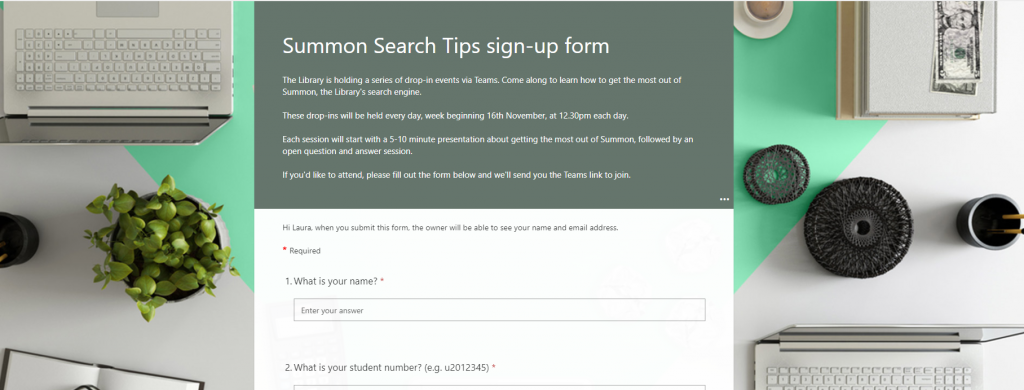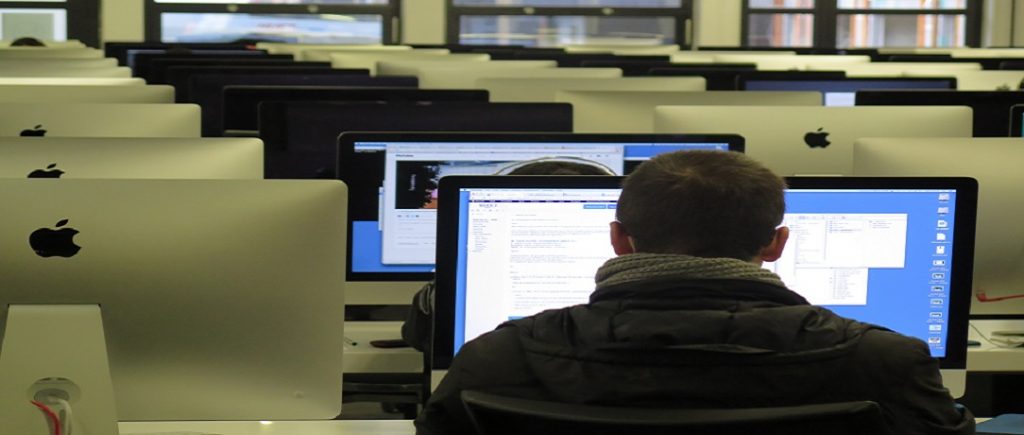Laura Woods is a Subject Librarian at the University of Huddersfield.
What sort of information literacy sessions have you run during the last few months?
In the autumn term of 2020, we ran a series of online drop-ins for students, using Microsoft Teams. We ran one per month, each on a specific theme:
- October – “Meet Your Librarian”: introductory Q&A with the Subject Librarian(s) for each of the seven Schools within the University, aimed primarily at new students.
- November – “Summon Search Tips”: an introduction to using Summon, our discovery tool.
- December – “APA 7th for Beginners”: introduction to referencing using APA 7th, the official referencing style used by most of the University.
We ran these daily, over the space of a week, usually at the same time each day (over lunchtime for the November and December drop-ins).
The sessions were promoted to students via announcements on the VLE, social media posts from the Library’s accounts, in a newsletter to students from Student Services, and we also asked academic staff to encourage their students to attend.
We asked participants to register in advance using an online form (set up in Microsoft Forms), so that we could then email them the Teams meeting link. On the form, we also provided a space for people to submit questions in advance.

Each drop-in started with a short (usually 10 minutes) presentation, followed by questions and answers. We went through the pre-submitted questions first, before taking questions from attendees. This enabled us to make sure we covered the most commonly asked questions first, as many of the pre-submitted questions on each topic were very similar.
Two members of staff were on each call: one to present, and one to manage the chat. We increased this to three staff members per drop-in for the APA 7th sessions, as the numbers attending were much higher.
What went well?
There was huge demand for these sessions, particularly the APA 7th referencing week which was attended by more than 400 students (over four days). The other two sessions were not quite as overwhelmingly busy, but still far more popular than any face-to-face sessions we had ever run. Around 100 students attended each of the previous drop-in weeks.
The sessions themselves worked well, with no major technical challenges to overcome. We had planned in advance for how to deal with technical problems, for example by preparing screenshots in case live demos were not possible, having staff members available as back-up in case any of us had connectivity problems, and by including troubleshooting instructions for anyone who was struggling to join the session. Fortunately none of these contingencies were needed, but knowing they were there gave us confidence when delivering these sessions.
The feedback we received both during and after these sessions was overwhelmingly positive. Many attendees commented in the chat box at the end of the sessions how useful they had found them. We also circulated an online feedback form at the end of each session, and by email afterwards. 15% of attendees for the Summon drop-ins completed the feedback form, and 11% fed back from the APA drop-ins.
100% of responses to the Summon feedback survey agreed that they had learned something useful from the session. All but two responses to the APA feedback survey said the same (the two negative responses did not provide any other comments so we were unable to act on any feedback).
Feedback comments (from the form, chat messages during the session, and via email afterwards), included:
- “The help available at the library is approachable and very helpful, the information provided in a simple and easy way to understand and there’s no judgement. Thank you again!”
- “very approachable teaching, concise, informative, clear guidance, super helpful.”
- “The offer of further one to one support behind the scenes especially in this current climate, did give me that help is available at a time when one could be very isolated in their learning.”
- “I just wanted to say how useful the APA session was…you have just changed my life!”
One student also commented verbally that she had found the sessions “empowering”, and thanked us for offering this opportunity for detailed support when she had been feeling a bit lost and unsure of where to go for help.
What has been your biggest challenge?
Because these sessions were open to students of any subject and at any level, there was a wide range of prior knowledge and understanding represented. Although we had envisaged these drop-ins as being mostly of benefit to undergraduates, and had advertised them as beginners-level sessions, we did not restrict bookings to any particular level. Most attendees were undergraduates, but from a mix of years. We also had taught postgraduate students, PhD students, and even some staff attending.
This was a challenge as while most of the questions were extremely basic, some attendees wanted to ask more in-depth questions than we were able to answer in the session. For example, some PhD researchers who attended the Summon session wanted specific advice on their search strategies and keywords for their literature reviews.
We had agreed in advance to handle any in-depth queries like this by directing the students to contact the Library for a follow-up appointment, as it would be unfair to all attendees to spend lots of time with one person. All attendees who raised this readily accepted our explanation that we wanted to keep this session for questions and answers that would benefit everyone, rather than going into detail for one person’s research topic, and took us up on the offer of a follow-up appointment.
The pre-course admin was extremely time-consuming. All attendees had to be emailed on registration, and reminders on the day. This became difficult to keep up with when, as the events got closer, new registrations were coming in extremely quickly. A lot of time was also taken up with responding to queries. We have addressed this for future events by using Microsoft Flow to automate the registration and reminder emails. We have also revised the text on the form and in the registration email to include more information up front, which we hope will cut down on the number of queries.
What are your future plans?
We plan to continue our drop-ins in February and March 2021. We have scheduled them in and started advertising to students. We are repeating the Summon and APA 7th drop-ins for January starters, plus anyone who missed the previous ones and wants to catch up. We are also offering two additional drop-ins based on the most common topics requested for future sessions on the feedback form: literature searching, and reference management software.
The literature searching drop-in will be primarily aimed at final year undergraduates, and will aim to provide tips and guidance for those just starting their dissertation literature reviews. The reference management software drop-in will give an overview of the main features of RefWorks and EndNote, and provide additional resources to follow up on after the session.
We will review all sessions over the summer, and develop a plan for continuing these in the 2021-22 academic year. Of course, we do not know if we will be back to normal face-to-face teaching by then! However we think there may still be appetite for online training, even once we return to campus.
Can you share 3 top tips for others planning to do something similar?
Make sure you have enough staff to cope with demand! Most sessions were manageable with two members of staff: one to present, and the other to keep an eye on the chat, answer quick questions, and make sure that questions for the presenter were asked in order. We added a second chat moderator for the APA 7th drop-ins once we saw how many people were registering, which turned out to be essential. As so many people attended these sessions, during them the questions were coming in quicker than we could answer! Having two people to queue-manage and answer questions that could be responded to in the chat was very helpful.
Have a plan for the session, but try not to be too rigid about it. As each of the daily events for each theme was delivered by a different member of the team, we created a basic PowerPoint we could all use for the introductory part of the session and the pre-submitted questions. This ensured consistent information was delivered, but allowed us each to present in a way that we were most comfortable with.
Share experiences and feedback after each event. As is the nature of a live event, each went a little differently, and different questions were asked at each one. After each event, the librarians who presented shared any tricky or unusual questions they had been asked with the rest of the team, so we would be prepared if anything similar came up at subsequent sessions.




Excellent ideas, and some really good advice – thanks 👍